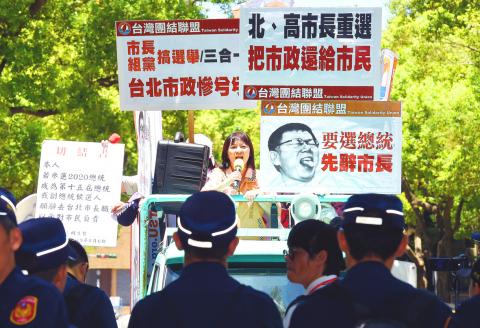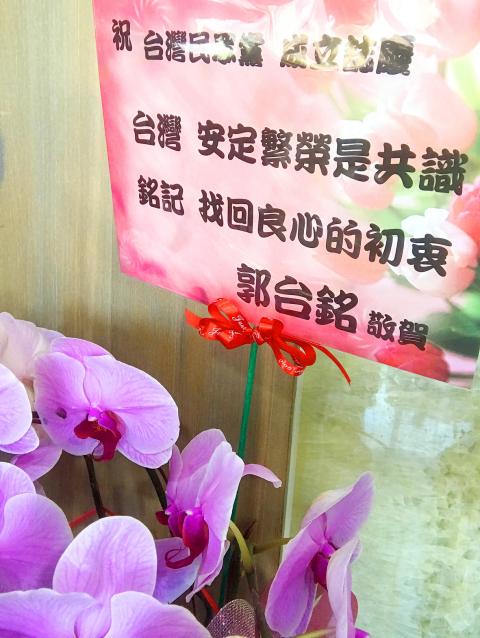The Taiwan People’s Party (台灣民眾黨, TPP) was formally established yesterday in Taipei, with the party announcing its constitution and the election of Taipei Mayor Ko Wen-je (柯文哲) as its chairman.
The founding ceremony was held at the National Taiwan University Hospital International Convention Center, with hundreds of people attending.
Ko arrived shortly past noon and was welcomed by enthusiastic chants of: “Taiwan’s choice — Ko Wen-je,” “The best choice — Ko Wen-je” and “The party members’ choice — Ko Wen-je” — similar to the slogans used during his mayoral re-election campaign last year.

Photo: Liu Hsin-de, Taipei Times
The party has 111 founding members, with 72 attending the morning meeting to decide the party’s constitution and elect a chairman, a cohost of the event said.
The founding members include members of the Ko administration — adviser Tsai Pi-ju (蔡壁如), Secretary-General Chang Jer-yang (張哲揚), spokesman Liu Yi-ting (劉奕霆) and deputy spokespeople Ke Yu-an (柯昱安) and Huang Ching-ying (黃?瑩) — and Taipei Rapid Transit Corp (台北捷運) chairman Lee Wen-tsung (李文宗).
Ko said that the TPP was founded to change Taiwan’s political culture, as the ideological battle between the two major parties has left the nation in a rut and led to friction over the past two decades.

Photo: Liao Chen-huei, Taipei Times
He said that his foremost principle is to promote the nation’s “general interests and the public’s maximum well-being.”
The biggest problem that Taiwanese politics has faced since 2000 is the destruction of the civil service system, because policies can be suddenly changed by political forces, without professional and technical discussions, unlike the past when there were technocrats, he said.
“While honesty and diligence should be basic requirements of government, they have become rare in today’s Taiwan,” he said, adding that the government needs to improve governance, regain the public’s trust and highlight the nation’s value to the world with a graft-free government.

Photo: CNA
Ko reiterated that he believes “Taiwanese values” are the implementation of universal values in Taiwan, including democracy, freedom, diversity, openness, rule of law, human rights, caring for the underprivileged and sustainable development.
“The TPP we established today is the coming together of ideas. We are not political leaders, but rather hope to become preachers of culture,” he said.
Public opinion, professional expertise and values are the three most important elements in decisionmaking, he added.
According to the party’s charter, the TPP conforms to the existing constitutional system and aims to strengthen national governance, enhance national interest and abolish corruption.
It will take a practical approach in foreign relations to ensure Taiwan’s survival and protect its sovereignty, it says.
Hon Hai Precision Industry Co (鴻海精密) founder Terry Gou (郭台銘) and Chinese Nationalist Party (KMT) Legislator Wang Jin-pyng (王金平) sent flowers to congratulate the party on its founding.
Gou’s gift came with a card that says: “Remember the reason it all started. It is our shared goal to ensure Taiwan’s stability and prosperity.”
Wang’s gift came with a message calling for solidarity to ensure peace and stability for Taiwan.
Gou’s and Wang’s gifts were the only flower baskets placed at the entrance of the venue.
Yonglin Education Foundation chief executive officer Amanda Liu (劉宥彤), a member of Gou’s campaign team, said she attended the event in her personal capacity to offer the party her best wishes.
The event coincided with Ko’s 60th birthday, and the mayor’s parents attended the event, where supporters shouted “Happy birthday” to Ko.
Outside the venue, several members of pro-independence groups and self-styled “Ko haters” staged a rally and called on Ko to resign as mayor if he runs for next year’s presidential election.
Additional reporting by Ann Maxon

Intelligence agents have recorded 510,000 instances of “controversial information” being spread online by the Chinese Communist Party (CCP) so far this year, the National Security Bureau (NSB) said in a report yesterday, as it warned of artificial intelligence (AI) being employed to generate destabilizing misinformation. The bureau submitted a written report to the Legislative Yuan in preparation for National Security Bureau Director-General Tsai Ming-yen’s (蔡明彥) appearance before the Foreign Affairs and National Defense Committee today. The CCP has been using cognitive warfare to divide Taiwanese society by commenting on controversial issues such as Taiwan Semiconductor Manufacturing Co’s (TSMC, 台積電) investments in the

INVESTIGATION: The case is the latest instance of a DPP figure being implicated in an espionage network accused of allegedly leaking information to Chinese intelligence Democratic Progressive Party (DPP) member Ho Jen-chieh (何仁傑) was detained and held incommunicado yesterday on suspicion of spying for China during his tenure as assistant to then-minister of foreign affairs Joseph Wu (吳釗燮). The Taipei District Prosecutors’ Office said Ho was implicated during its investigation into alleged spying activities by former Presidential Office consultant Wu Shang-yu (吳尚雨). Prosecutors said there is reason to believe Ho breached the National Security Act (國家安全法) by leaking classified Ministry of Foreign Affairs information to Chinese intelligence. Following interrogation, prosecutors petitioned the Taipei District Court to detain Ho, citing concerns over potential collusion or tampering of evidence. The

‘COMPREHENSIVE PLAN’: Lin Chia-lung said that the government was ready to talk about a variety of issues, including investment in and purchases from the US The National Stabilization Fund (NSF) yesterday announced that it would step in to staunch stock market losses for the ninth time in the nation’s history. An NSF board meeting, originally scheduled for Monday next week, was moved to yesterday after stocks plummeted in the wake of US President Donald Trump’s announcement of 32 percent tariffs on Taiwan on Wednesday last week. Board members voted to support the stock market with the NT$500 billion (US$15.15 billion) fund, with injections of funds to begin as soon as today. The NSF in 2000 injected NT$120 billion to stabilize stocks, the most ever. The lowest amount it

NEGOTIATIONS: Taiwan has good relations with Washington and the outlook for the negotiations looks promising, Minister of Economic Affairs J.W. Kuo said Taiwan’s GDP growth this year is expected to decrease by 0.43 to 1.61 percentage points due to the effects of US tariffs, National Development Council (NDC) Minister Paul Liu (劉鏡清) said at a meeting of the legislature’s Economics Committee in Taipei yesterday, citing a preliminary estimate by a private research institution. Taiwan’s economy would be significantly affected by the 32 percent “reciprocal” tariffs slapped by the US, which took effect yesterday, Liu said, adding that GDP growth could fall below 3 percent and potentially even dip below 2 percent to 1.53 percent this year. The council has commissioned another institution